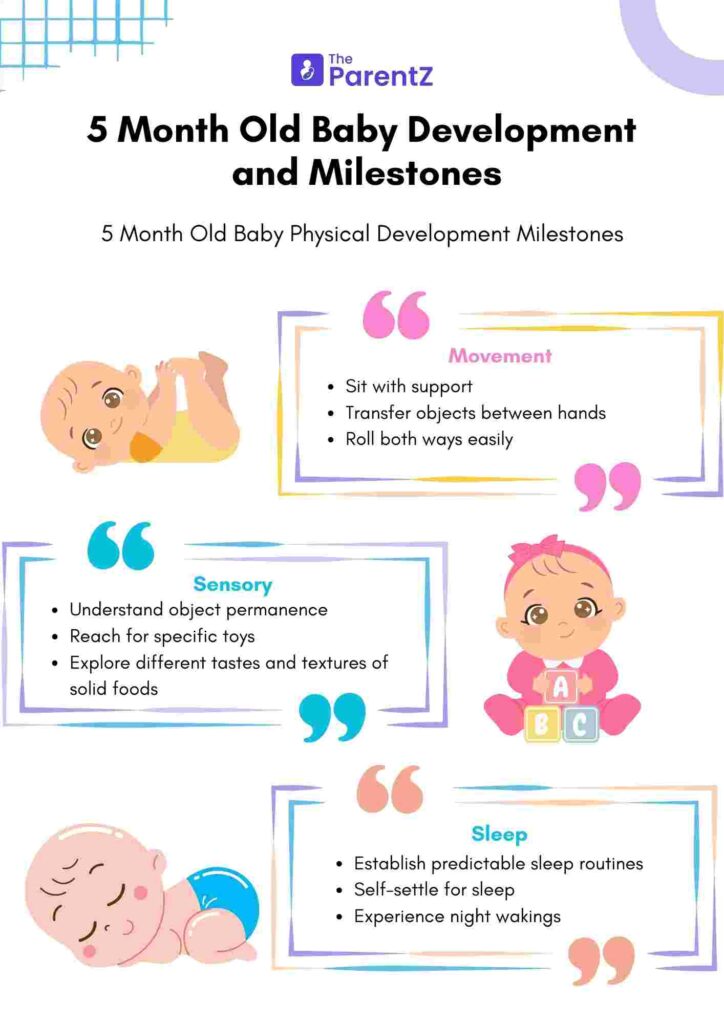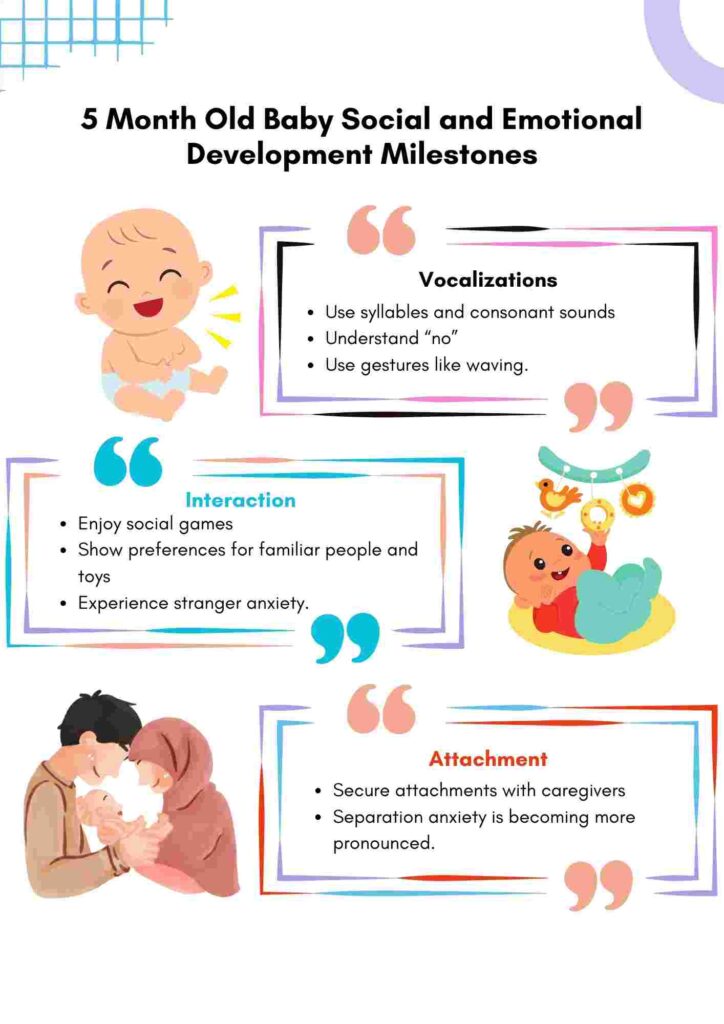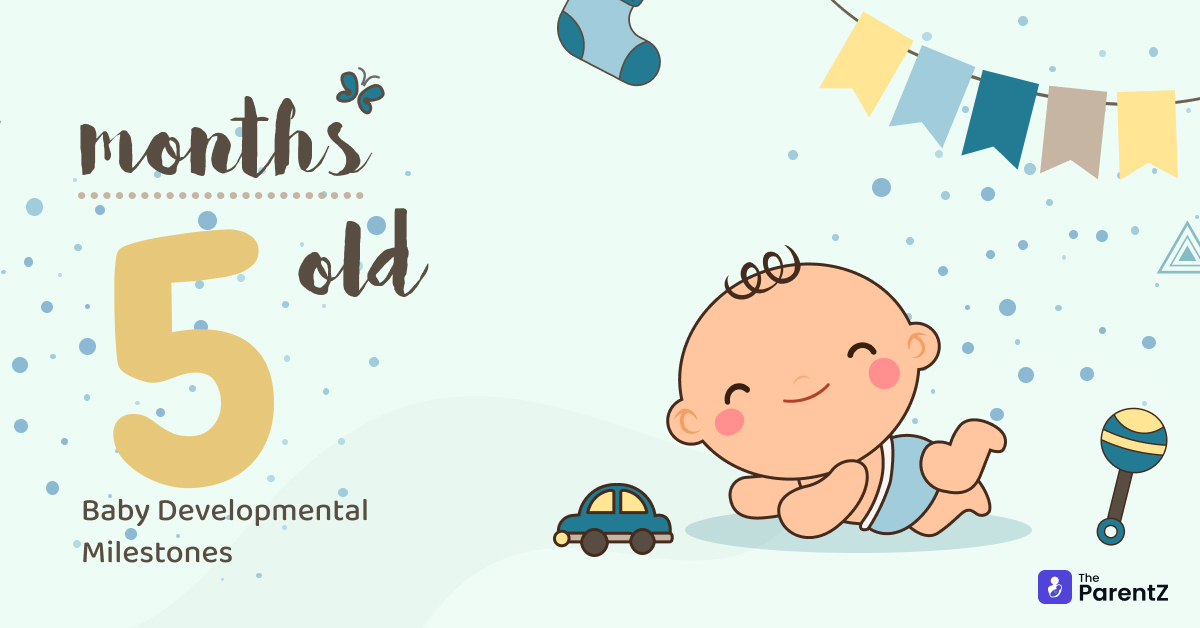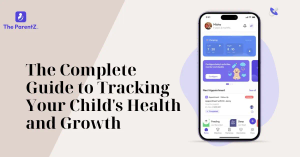Your baby is developing rapidly and acquiring knowledge on a daily basis. At 4 months, they rolled over, giggled, and babbled. At five months old, they are now willing to venture into the world with more curiosity and communication. They are also becoming more attached to you and more aware of their surroundings.
Here are some of the amazing growth and developmental milestones that your 5-month-old baby may achieve in the following areas:
5 Month Old Baby Physical Development Milestones
Movement
Your baby’s physical skills are advancing quickly. They may be able to do some of these things:
- Sit with support. . You can make your baby sit with his help, a cushion, or a chair. They are able to keep their heads and chests stable while looking around curiously. They will also attempt to sit lopsidedly and touch anything nearby.
- Transfer objects between hands. Your infant is able to transfer toys or other objects from one hand to the other. In addition, they may also hold or shake an object with both hands. This indicates their enhanced hand-eye coordination and gross motor function.
- Roll both ways easily. Your baby is able to roll from her back to the tummy, but she may also do the reverse process. They can also roll in other directions. This enables them to workout their muscles and roam their surroundings.
Sensory
Your baby’s sensory skills are also becoming more sophisticated. They may be able to do some of these things:
- Understand object permanence. Your baby starts understanding that objects are present even though they are out of sight. They may seek out a toy that you conceal under a blanket or that tracks an object that is moved behind a screen. It reflects their cognitive development and memory.
- Reach for specific toys. . Your baby might have inclinations towards some toys, colors, or shapes. They might take an item of their preference or just leave the others. These objects may be at a distance, and so the child may try to reach out for them or move closer to them.
- Explore different tastes and textures of solid foods :Your child may touch and feel different textures—soft, hard, smooth, or rough. They can also take things to their mouths to explore them with their tongue and gums. They will also salivate more as they prepare for teething.
Sleep
Your baby’s sleep patterns may also become more predictable. They may be able to do some of these things:
- Establish predictable sleep routines. A baby’s bedtime and wake-up time may be more consistent, making his or her sleep sound and longer. They could also have regular naps that are fixed, that is, two to three during the day. You can comfort your baby by following a routine before bedtime, for example, bathing, reading, or singing.
- Self-settle for sleep. Your baby can learn how to sleep by themselves. They may also soothe themselves in the middle of the night by using their thumb, holding a blanket, or humming a song.
- Experience night wakings. A baby’s bedtime and wake-up time may be more consistent, making his or her sleep sounder and longer. They could also have regular naps that are fixed, that is, two to three during the day. You can comfort your baby by following a routine before bedtime, for example, bathing, reading, or singing.
5 Month Old Baby Social and Emotional Development Milestones
Vocalizations
Your baby’s social and emotional skills are also developing quickly. They may be able to do some of these things:
- Use syllables and consonant sounds. Your baby is capable of producing different sounds to imitate “ba,” “da,” “ga,” or “ma.” They may even attempt to mimic your speech or react to your sound. They may also acknowledge their name and respond by looking at you, smiling, or babbling.
- Understand “no”. Your baby can comprehend the message of the word “no” and its relevance to their behaviors. They may cease their activities or even nod their heads in negation when you say “no” to them. They may go further and respond “no” to symbolize their disapproval or rejection.
- Use gestures like waving. Your baby can use sign language, for example, by waving hello or goodbye, pointing to something, or clapping their hands. They may further get your signs, e.g., nodding, head shaking, or even blowing a kiss.
Interaction
Your baby’s interaction with others is also becoming more complex. They may be able to do some of these things:
- Enjoy social games. Simple games include peek-a-boo, pat-a-cake, and hide-and-seek. They may also start or react to these games by covering their faces, clapping their hands, or seeking you out.
- Show preferences for familiar people and toys. Your baby may have likes and dislikes for certain people and toys. They may smile, laugh, or grasp the ones they like, or cry, fuss, or reject the ones they don’t. They can also have a toy, blanket, or dummy that they will want to keep with them.
- Experience stranger anxiety. Your baby may grow more dependent on you and become anxious when you leave. They may also show crying, clinging, and protesting behavior when you leave them or a stranger approaches them. This is normal and is a sign of a strong bond between you and your baby.
Attachment
Your baby’s attachment to you is also becoming stronger. They may be able to do some of these things:
- Secure attachments with caregivers. A secure bond between your baby and you and other caregivers, including grandparents and babysitters, is possible. They can express their love by smiling, hugging, or kissing. They might as well look for your understanding when they are unhappy, injured, or frightened.
- Separation anxiety is becoming more pronounced. They might either cry, scream, or stick to you when you are trying to leave them or when someone else is trying to keep them. They might also develop sleeping and eating problems in your absence. This is not unusual but rather normal, as it is a sign of your baby’s dependency on you and also of them missing you.
Conclusion
Your 5-month-old baby is fabulous. They are advancing every day. They are making themselves more active, inquisitive, and communicative. They are also creating their own characteristics and choices.
Keep in mind that every baby is an individual, and they may achieve these milestones at varying times. Do not be concerned if your baby is quicker or slower than the rest; as long as they are content and healthy, they are fine. If you are worried about the development of your baby, you can always consult a pediatrician or a child development specialist.
Be happy with your child during this extraordinary period of their life, and appreciate their accomplishments. This is amazing, and so are you!


For a glimpse into your 6-month-old’s development, delve into our guide on 6 Month Old Development Milestones.





Be the first one to comment on this story.